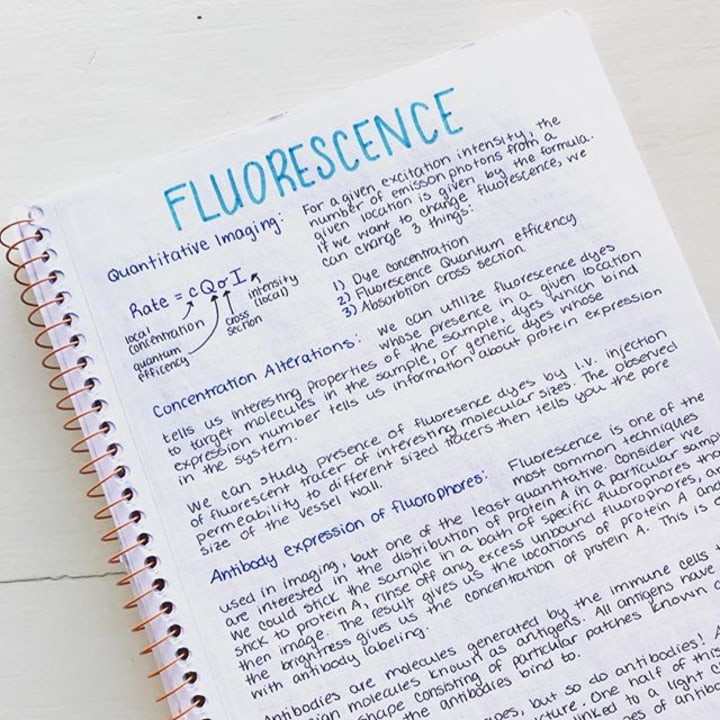Mission Impossible: Staying Motivated to Study in College
Here are 7 tips that have kept me motivated to study during college.

Sometimes getting motivated isn't the problem, but staying motivated can be hard for some students. For those of you who don't know me, my name is Tresa and I am a #studygrammer. My main goal and the reason I start my studygram is to motivate my followers to study and help perfect their study habits.

A post of my notes from my studygram @tresasnotebook
My main form of motivation is through my Instagram posts. A lot of people find motivation and inspiration in aesthetically-pleasing snapshots of my notes or satisfying time-lapse videos of the creation of my notes. Some of my followers have told me that my posts give them a boost of energy to get studying. Although getting started is the first and most important step, staying motivated is also key to effective studying. Hence, the motivation for this article.
In this article, I will discuss 7 tips for staying motivated to study.
1. Set goals and remembe to reward yourself.
It may seem like a waste of time, but goal setting is an excellent way to keep your motivation high. A key part to goal setting that most people forget is to reward yourself for completing your goal. A good strategy is to set "mini rewards" between goals, like a 5-minute break or go get a snack. Conclude your final goal with a "final reward," which could be a TV break or simply packing your bags up and resting for the remainder of the night. People often think of goals as having to be big, which is not necessarily true. Set big long-term goals and manageable short-term goals. Use your short-term goals as stepping stones to your long-term goals.
Suppose you have an exam coming up and you need to know chapters 10-12 of your over-priced textbook. Don't make one goal and say you want to read all three chapters, annotate, and compile a study packet. Make a list of goals. For example:
- Read and highlight Ch. 10
- Mini reward
- Read and highlight Ch. 11
- Mini reward
- Read and highlight Ch. 12
- Mini reward
- Go back and collect important points to compile a study packet
- Final reward
Study planners are an excellent way of tracking your goals and accomplishments. Below is a printable study planner packet that I have created to fit the needs of any student!
2. Track your success.
The best part of making a list is crossing things off, right? As you complete tasks on your to-do list or reach a goal on your goals list, cross it off! Or, write down the things you have accomplished that day. Reflecting on previous accomplishments is an excellent motivational tool.
3. Prioritize.
A great way to prioritize your work is chronological. If you were to make a pile of work you needed to get done during your study session, put the assignment with the closest due date on top and the one with the furthest due date on the bottom. But the key is, don't ignore the papers on the bottom of the stack!
It can be hard to stay motivated on an assignment when you have been procrastinating to start it; make some progress, even a little progress, on the assignment when it is first given to you to prevent loss of motivation as the due date draws near.
Suppose you organize your papers chronologically as explained above, and the assignment on the bottom of the stack is due in three weeks. Don't worry about rushing to start this assignment and focus on the papers at the top of the stack. Once those are completed to your satisfaction, start the least prioritized assignment. Now, the nice thing is since you are starting it early, you can decide how much of it you want to start doing. You should at least do something to put a dent in it; you could read the assignment and highlight and annotate important points and call it a day.
Starting a project early, no matter how much you do, will prevent procrastination and loss of motivation later on.
4. Add some color.
Most of the time, you will find yourself lacking the motivation to study when you are staring at pages of notes that are just unicolor words on a piece of paper. It's like staring at a large blank canvas! It all looks the same and you don't know where to look or what you are looking for (unless you are a modern art aficionado, which I am not).
Adding color to your notes will keep you focused by not allowing your notes to become a sea of words lost in the paper. A simple way to do this is using highlighters and/or colored pens. Bright colored highlights, like Sharpie Highlighters, are very common, but a lot of people say they don't use highlighters anymore because they are too bright, too neon. I agree, the neon gives me a headache sometimes. A great highlighter/marker I use and highly recommend is Zebra Midliners. They have very nice colors that will liven up your notes but are not overwhelming.
Another way to add color and change up your notes is Sticky Notes! Use them to point out key points or add diagrams or additionally annotations into your notes.
5. Organize.
It seems basic, but keeping an organized study space and organized notes is a great and easy way to stay focused and motivated. Here are a few organizational tips I recommend:
- Clear your desk/table of distractions (phone, knick-knacks, miscellaneous papers, etc.)
- Chronologically stack your assignments, as discussed earlier, and as you work through them create two piles: "completed" and "not completed." At the end of your study session, put the completed papers in your folder, chronologically stack the not completed pile, and repeat.
- Clean your backpack before you go to school or to study. A cluttered backpack can be distracting and it makes it easier to lose stuff. Take out papers or folders you don't need.
- Have only what you need on your study station: water/snack, books and relevant assignments, study planner, pens/pencils, etc.
6. Change it up.
It is easy to get bored when you study in the same spot every time. Move around and change your environment! If you always study in your room, maybe try studying in the dining room or common area. If you always study in the same spot in the library, try a different floor or a different spot.
If you find that your new spot is too distracting you can move elsewhere. It is important to change it up every once in a while to keep you out of a rut.
7. Remind yourself of the end goal.
You want that diploma, don't you? Don't lose sight of the end goal.
About the Creator
Tresa
Just a college student with a lot to share!
Enjoyed the story? Support the Creator.
Subscribe for free to receive all their stories in your feed. You could also pledge your support or give them a one-off tip, letting them know you appreciate their work.






Comments
There are no comments for this story
Be the first to respond and start the conversation.